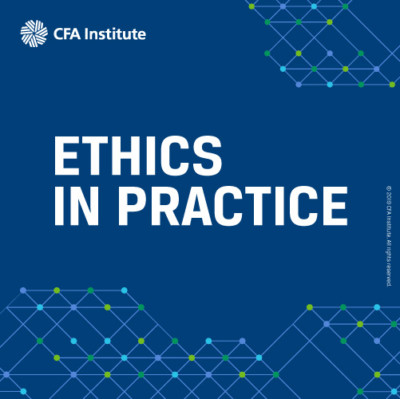Ethics in Practice: Error Correction Accounts. Case and Analysis–Week of 2 September
Check out the analysis to see how you did in analyzing this week’s case (2 September) and determining which CFA Institute Standard was involved.
Case
Manley is an investment adviser for a regional bank with a number of discretionary, fee-based accounts for high-net-worth individuals. The bank’s internal policies and procedures permit trade error corrections for up to 30 days following a failure to place a trade. The policy is intended to address errors in which an adviser fails to send an order to the trade desk. To rectify the error, the adviser is permitted to buy or sell a security at the current market price, with the price differential charged to the adviser personally through an internal error account. On many occasions, Manley uses the trade error correction policy to benefit clients who are unhappy with their account performance. Manley identifies a security whose price has increased in the last 30 days. He then tells the trade desk that he had mistakenly failed to buy that particular security some days before when the price was substantially lower than the current market price. Once the request is approved, the trade desk purchases the security and charges the price differential to Manley personally through the error account. Shortly thereafter, Manley sends an order to sell the security and net a profit for the client. Manley then tells the client that he had “flipped” them a profitable trade or has given them a “gift” or “no-risk” trade. Manley’s actions are
- inappropriate.
- appropriate because Manley is acting for the benefit of the client.
- appropriate because the bank is not harmed by Manley’s actions.
- appropriate because Manley has disclosed to the client that he engaged in a no-risk trade on their behalf.
- none of the above.
Analysis
This case relates to professional misconduct. CFA Institute Standard I(D): Misconduct prohibits CFA charterholders from engaging in professional conduct involving dishonesty, fraud, or deceit. Manley engaged in a misleading, fraudulent, and deceptive practice when he misused the bank’s policies for error correction to enhance client account performance when no legitimate error had been made. In effect, he personally compensated clients as a way of misleading them about his true ability as an investment adviser as well as about the real performance of their accounts so that they would continue as his clients. The fact that these practices did not cause financial losses for either his clients or the bank does not make the conduct any less deceptive or misleading. Disclosing to clients that he provided them a “gift” or “no-risk” trades also does not mitigate the fraudulent conduct. Choice A is the best response.
This case is based on a March 2019 enforcement action by the Investment Industry Regulatory Organization of Canada.
Let us know what you think of Ethics in Practice by taking this short survey.
Have an idea for a case for us to feature? Send it to us at [email protected].
More About the Ethics in Practice Series
Just as you need to practice to become proficient at playing a musical instrument, public speaking, or playing a sport, practicing assessing and analyzing situations and making ethical decisions develops your ethical decision-making skills. The Ethics in Practice series gives you an opportunity to “exercise” your ethical decision-making skills. Each week, we post a short vignette, drawn from real-world circumstances, regulatory cases, and CFA Institute Professional Conduct investigations, along with possible responses/actions. We then encourage you to assess the case using the CFA Institute Ethical Decision-Making Framework and through the lens of the CFA Institute Code of Ethics and Standards of Professional Conduct. Then join the conversation and let us know which of the choices you believe is the right one and explain why. Later in the week, we will post an analysis of the case and you can see how your response compares.
Image Credit: ©CFA Institute


A. Manley’s actions are inappropriate. Even though Manley’s actions do not cause any harm to the employer, Manley is not being loyal to his employer-standard IV(A) as well his clients- standard III(A). Also, Manley’s actions can be considered under Standard I(c)-Misrepresentation by false reporting the performance of the accounts being managed by him.
inappropriate
Inappropriate
Iappropriate
Inappropriate. (And quite unethical I may add).
Inappropriate
He was buying client loyalty by offering guarantees. And when he couldn’t earn the guaranteed return in the securities market he was fraudulently backdating transactions and paying out of pocket through an error account. Essentially bribing his clients through what he called a ‘gift trade’. Here is the link containing the statement of allegations.
https://www.iiroc.ca/documents/2019/d16c744b-a43b-4b2d-9f89-9599425cb857_en.pdf
As a charter holder and advocate for investment advisors worldwide this should be a cautionary tale for blatant market integrity abuse. His 3 week trial is set for late November.